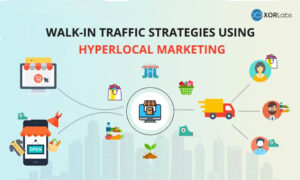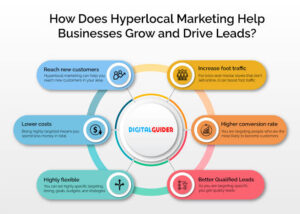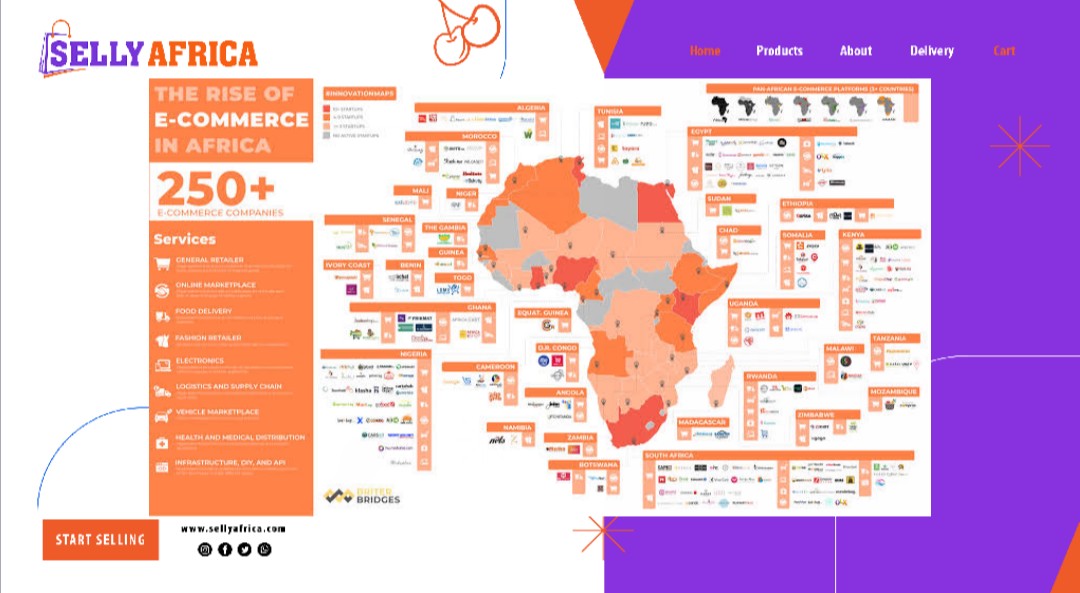Africa, the continent of vibrant diversity, rich cultural heritage, and untapped economic potential. As the e-commerce landscape continues to evolve, entrepreneurs and businesses are increasingly looking to Africa as a fertile ground for growth. However, the key to unlocking success in this vast and varied market lies in understanding the nuances of local markets and tailoring marketing strategies to meet the unique needs and preferences of each region. This is where hyperlocal marketing comes in – a targeted approach that zeros in on specific geographic locations, leveraging local knowledge, and cultural insight to drive engagement and conversion. From the bustling streets of Lagos to the vibrant cityscape of Cape Town, hyperlocal marketing has the potential to ignite your e-commerce business in Africa, and in this post, we’ll explore the strategies, tactics, and opportunities that will help you succeed in this dynamic and rapidly growing market.
Introduction to hyperlocal marketing
One strategy that has proven to be highly effective in recent years is hyperlocal marketing which focuses on extremely localized targeting. It allows businesses to tailor their marketing efforts to specific geographic areas, creating a more personalized and relevant experience for customers.

Imagine being able to serve ads to customers who are physically close to your store or warehouse, or offering special promotions to customers in a specific neighborhood. With hyperlocal marketing, this is now a reality. By leveraging advanced technologies such as GPS, businesses can pinpoint their target audience with uncanny accuracy, ensuring that their marketing messages are seen by the right people, at the right time, and in the right place.
In the context of Africa, where traditional marketing channels can be unreliable or non-existent, hyperlocal marketing offers a unique opportunity for e-commerce businesses to reach their target audience in a more targeted and cost-effective way. By tapping into the growing mobile penetration rates and increasing adoption of digital technologies, hyperlocal marketing can help businesses in Africa to build brand awareness, drive website traffic, and ultimately, boost sales and revenue by allowing entrepreneurs to leverage location-based data, social media, and local SEO to create highly personalized, relevant, and impactful campaigns. By focusing on micro-markets within a region, you can increase brand awareness, drive foot traffic, and ultimately, boost sales.
The African ecommerce landscape
As the continent continues to urbanize and digitize, the e-commerce landscape is rapidly evolving. With a growing middle class, increasing internet penetration, and a young population, Africa presents a fertile ground for e-commerce businesses to flourish. However, the African market is not without its challenges. Infrastructure limitations, logistical hurdles, and varying consumer preferences across different regions can make it difficult for businesses to navigate.
Despite these challenges, the opportunities are vast. The African e-commerce market is projected to reach $75 billion by 2025, with Nigeria, South Africa, and Egypt leading the charge. The rise of mobile payment systems, such as M-Pesa in Kenya, has also simplified online transactions, making it easier for consumers to shop online. Furthermore, the increasing popularity of social media platforms has created new avenues for businesses to reach and engage with their target audience. As the African e-commerce landscape continues to evolve, businesses that adapt to the unique needs and preferences of each region will be best positioned to thrive.
The power of local in Africa
In this vibrant tapestry, local connections and relationships are the fabric that holds society together. For e-commerce businesses operating in Africa, understanding the significance of local cannot be overstated. Hyperlocal marketing, in particular, has the potential to ignite your online business by speaking directly to the hearts and needs of African consumers.

In Africa, local is not just a geographical term, but a cultural and emotional one. People identify strongly with their neighborhoods, cities, and regions, and expect businesses to understand and cater to their unique needs and preferences. By adopting a hyperlocal marketing approach, you can tap into this sense of community and belonging, building brand loyalty and trust with your customers.
Imagine being able to offer products and services that are tailored to the specific needs of Lagosians, Capetonians, or Nairobi residents. Imagine being able to communicate with your customers in their local languages, using messaging that resonates with their daily experiences and aspirations. This is the power of hyperlocal marketing in Africa, and it’s an opportunity that e-commerce businesses cannot afford to miss.
Understanding your African customer
As you embark on your hyperlocal marketing journey across Africa, it’s essential to understand the diverse and complex tapestry of cultures, languages, and preferences that define the continent’s consumers. The African customer is not a monolith, and what works in Lagos may not resonate in Nairobi. To effectively connect with your target audience, you need to delve deeper into their values, behaviors, and pain points.
In Nigeria, for instance, the burgeoning middle class is driving a surge in e-commerce adoption, with consumers seeking convenience, quality, and affordability. In contrast, Cape Town consumers are highly influenced by social media and online reviews, with a strong emphasis on customer service and loyalty programs. Meanwhile, in Kenya, mobile payments have become an integral part of daily life, making it a crucial aspect of any e-commerce strategy.
By understanding these nuances, you can tailor your marketing efforts to speak directly to the needs and aspirations of your target audience. This might involve using local languages, partnering with influencers, or incorporating traditional payment methods into your platform. By doing so, you’ll be able to build trust, foster loyalty, and ultimately, drive conversion rates that will propel your e-commerce business forward in the African market.
Success stories in Lagos and Cape Town
The power of hyperlocal marketing is not just theoretical; it’s been proven time and time again in the vibrant cities of Lagos and Cape Town. Let’s take a closer look at two remarkable success stories that demonstrate the impact of this targeted approach.
In Lagos, a popular fashion e-commerce platform, Jumia, leveraged hyperlocal marketing to drive sales and engagement. By tailoring their advertising and promotions to specific neighborhoods, such as Ikeja and Victoria Island, they saw a significant increase in conversions and a 30% boost in sales. This was achieved by partnering with local influencers, running targeted social media ads, and offering location-based discounts that resonated with the local population.
Meanwhile, in Cape Town, a leading online retailer of outdoor gear, Takealot, used hyperlocal marketing to conquer the local market. By focusing on the city’s outdoor enthusiasts, they created targeted campaigns that highlighted the best hiking trails, surf spots, and camping sites in the region. This not only drove sales but also positioned the brand as a trusted authority in the local outdoor community. The result? A 25% increase in website traffic and a 40% surge in sales of outdoor gear.
These case studies demonstrate the immense potential of hyperlocal marketing in Africa’s e-commerce landscape. By understanding the unique needs, preferences, and behaviors of local customers, businesses can create targeted campaigns that drive real results and establish a strong presence in the market.
Identifying hyperlocal opportunities in Africa
As you embark on your hyperlocal marketing journey in Africa, it’s essential to identify the opportunities that exist in this vast and diverse continent. With 55 countries, over 2,000 languages, and a population of over 1.3 billion people, Africa presents a complex yet fertile ground for hyperlocal marketing. From the bustling streets of Lagos to the vibrant townships of Cape Town, there are countless opportunities to connect with local customers and tailor your marketing efforts to their unique needs and preferences.
To identify these opportunities, you need to delve deeper into the African market, analyzing demographics, consumer behavior, and local trends. You may discover that certain regions have a high demand for specific products or services, or that certain languages or cultural nuances hold the key to unlocking customer loyalty. For instance, in Nigeria, where there is a large youth population, you may find that social media campaigns targeting this demographic are particularly effective. In South Africa, where there is a strong emphasis on community and family, you may find that localized content and influencer partnerships resonate more with customers.

By understanding the unique characteristics of each region and tailoring your marketing efforts accordingly, you can create a hyperlocal strategy that speaks directly to the hearts and minds of African consumers. This is where the true power of hyperlocal marketing lies – in its ability to create a sense of belonging, relevance, and connection with local customers, driving loyalty, advocacy, and ultimately, business growth.
Creating a hyperlocal marketing strategy
A one-size-fits-all approach won’t cut it here. To truly resonate with your target audience, you need to craft a strategy that speaks to the unique nuances of each region.
Imagine walking down the bustling streets of Lagos, where the sounds of Afrobeats and the aroma of jollof rice fill the air. Your marketing strategy should be as vibrant and energetic as the city itself. In contrast, Cape Town’s laid-back surfer vibe demands a more relaxed, outdoor-inspired approach. By understanding the local dialect, customs, and preferences, you can tailor your messaging to strike a chord with your audience.
A successful hyperlocal marketing strategy in Africa involves identifying the specific pain points, needs, and desires of each region. This might involve partnering with local influencers, leveraging regional languages and slang, or creating content that celebrates the diversity of African cultures.
Leveraging mobile technology for hyperlocal marketing
As the continent with the highest mobile penetration rate, Africa presents a unique opportunity for e-commerce businesses to leverage mobile technology for hyperlocal marketing. With more than 70% of Africans accessing the internet through their mobile devices, it’s no surprise that mobile-centric marketing strategies are becoming increasingly effective. By harnessing the power of mobile technology, you can target customers with location-specific offers, personalized messages, and timely promotions that resonate with their immediate needs.
Imagine being able to send personalized push notifications to customers in Lagos about a flash sale at a nearby store, or offering exclusive discounts to shoppers in Cape Town who are within walking distance of your physical location. Mobile technology makes it possible to connect with customers in real-time, creating a seamless and immersive shopping experience that drives conversions and loyalty. Moreover, mobile-friendly websites and apps can help you tap into the growing demand for online shopping in Africa, where many consumers are skipping traditional desktop computers and going straight to mobile devices.
Measuring the success of hyperlocal marketing campaigns
Measuring success is not just about tracking numbers; it’s about understanding the impact of your efforts on your target audience. In the context of hyperlocal marketing, success can be measured in various ways, from the number of in-store visits to the increase in online sales. One effective way to gauge the effectiveness of your campaign is to set up geotargeted tracking, which allows you to monitor the foot traffic and online engagement generated from your targeted ads. You can also use tools like Google Analytics to track the conversion rates, bounce rates, and average order value of customers who interact with your hyperlocal campaigns. Additionally, conducting regular surveys and gathering feedback from your customers can provide valuable insights into the perceived value of your hyperlocal marketing efforts.
Overcoming challenges in hyperlocal marketing in Africa
From navigating the complexities of diverse local cultures and languages to addressing the limitations of digital infrastructure, overcoming these hurdles requires a deep understanding of the African landscape.
One of the most significant challenges is the lack of reliable data and accurate targeting. In many African countries, traditional data collection methods are often unreliable, and online data is scarce, making it difficult to create targeted campaigns that resonate with your audience. Additionally, the fragmented nature of African markets, with varying consumer preferences and behaviors, can make it challenging to develop a one-size-fits-all marketing strategy.
Furthermore, limited digital literacy, internet penetration, and mobile connectivity in some regions can hinder the effectiveness of your hyperlocal marketing efforts. You may need to invest in education and awareness initiatives to bridge the digital divide and ensure that your target audience is equipped to engage with your brand online.
Despite these challenges, the potential rewards of hyperlocal marketing in Africa are substantial. By understanding the nuances of each market and adapting your strategy to address these challenges, you can unlock new opportunities, build strong relationships with your customers, and establish a strong foothold in the African e-commerce market.
The future of hyperlocal marketing in Africa
As the African e-commerce landscape continues to evolve, the future of hyperlocal marketing looks brighter than ever. With the rapid growth of urbanization, mobile penetration, and digital literacy, the opportunities for hyperlocal marketing to drive business growth are vast. In the coming years, we can expect to see more sophisticated uses of location-based targeting, augmented reality, and artificial intelligence to deliver personalized, contextual experiences to customers.
Imagine a world where a customer in Lagos receives a personalized offer on their phone as they walk past a store, or where a retailer in Cape Town uses hyperlocal marketing to target customers in a specific neighborhood with a limited-time promotion. The possibilities are endless, and the brands that invest in hyperlocal marketing today will be the ones that reap the rewards tomorrow.
As the African e-commerce market continues to mature, hyperlocal marketing will play an increasingly important role in driving sales, increasing customer engagement, and building brand loyalty. With the right strategy and tools, businesses can tap into the vast potential of the African market and create a loyal customer base that will drive growth for years to come. The future of hyperlocal marketing in Africa is bright, and those who seize the opportunity now will be the ones leading the charge.
Conclusion
As we’ve traversed the vast expanse of the African continent, from the bustling streets of Lagos to the vibrant shores of Cape Town, one thing is clear: hyperlocal marketing is the key to unlocking the full potential of e-commerce in Africa. In a continent where diversity is the norm, hyperlocal marketing offers a way to speak to customers in their own language, to understand their unique needs and preferences, and to deliver targeted messages that resonate deeply. By doing so, businesses can break down the barriers that have long hindered e-commerce adoption in Africa, and tap into the vast opportunities that this rapidly growing market presents. As the African e-commerce landscape continues to evolve, one thing is certain: those who adapt to the unique nuances of each region, and who invest in hyperlocal marketing strategies, will be the ones who emerge victorious. So, whether you’re a seasoned e-commerce player or just starting out, it’s time to rethink your approach and harness the power of hyperlocal marketing to ignite your business in Africa.
